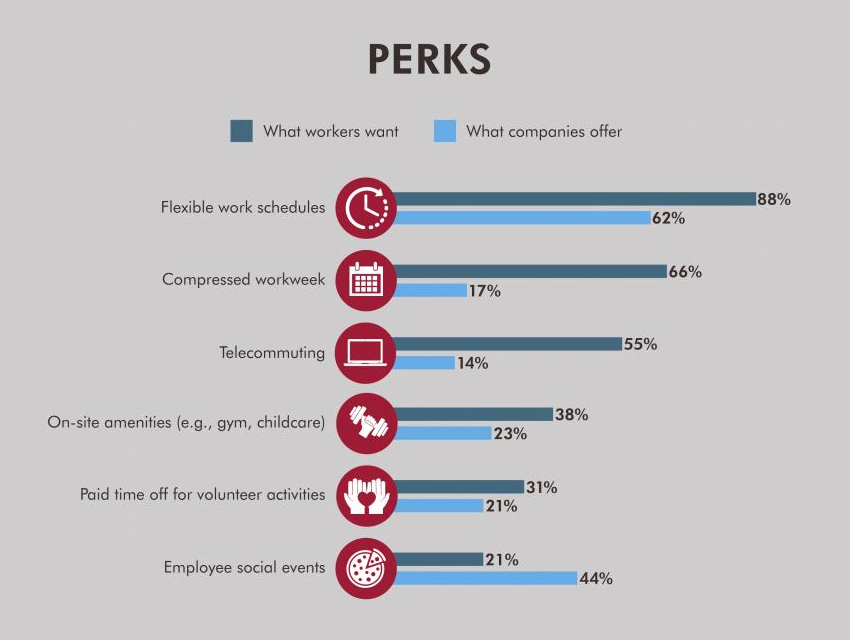Co-Authored By Linda Bisca, HR Business Partner and Marisa Horton, Recruiter
A competitive offer to your top candidate should consider more than just title and salary range, especially in today’s tight hiring market. Perks and benefits are an important consideration for job seekers as they evaluate a job offer. In fact, a study by Score found that 80% of employees prefer benefits or perks over a pay raise.
As a small business owner, it might feel daunting to offer benefits and perks on par with a large company. However, by looking at your benefits and perks strategically, you can offer those perks that will have the highest return on investment for your company. Partnering with a Professional Employer Organization (PEO) like Resourcing Edge can help you offer benefits with the same providers large companies are using, at an affordable price.
Unsurprisingly, health care ranks as the most desired benefit. When it comes to benefits, companies are generally aware of what benefits employees want and their benefit offerings reflect that knowledge. However, employers often miss the mark on what perks employees are looking for. In a recent survey, 88% of employees desired a flexible work schedule, which only 62% of companies offer. In comparison, only 21% of employees surveyed reported wanting employee social events, with 44% of companies offering them. In this same survey, flexible work schedules, a compressed workweek, and telecommuting rated as the most coveted perks. What employees are really saying is that they want more control over how and when they complete their work.
 Source: Robert Half
Source: Robert Half
The good news is that some highly-valued perks can be implemented at little or no cost to the company. Below we explore perks that allow your employees greater control and make your company an attractive destination for top talent. Partnering with the HR professionals at Resourcing Edge can assure that the perks your company offers are popular and compliant.
Flexible Schedules
This perk allows employees to control when they get their work done. Depending on your business needs, this could mean allowing early or late starts to accommodate for work/life balance such as long commutes or childcare. In other cases, top performing employees are allowed first selection of their preferred shift or days off. Compressed workweeks offer the option of four 10-hour days, allowing workers a three-day weekend.
Flexible Worksite
Offering a flexible worksite, also known as telecommuting, allows employees to control where and how they complete their work. The extent of this flexibility can be controlled by the employer. Some roles can be filled by employees who exclusively work remotely. Other positions may offer the flexibility to work from home or other off-site location a pre-determined number of days or hours per week. Some businesses offer the ability to work remotely as needed, such as in the event of inclement weather, appointments out of the office, or when traveling.
Not only are flexible schedules and worksites economical perks to offer employees, but the return on investment for the company is high. Businesses that employ these strategies enjoy the following benefits:
- Reduced Overhead Costs – As businesses move to hiring more remote workers, they use less square footage to operate, which equates to lower costs.
- Increased Employee Retention – Flexible work options can help in retaining the best employees.
- Greater Employee Satisfaction – Employees place a very high value on working from home.
- Higher Productivity – Employees are more motivated because they have greater latitude to control their own environments and set their own schedules. There are fewer meetings, interruptions and distractions.
- Reduction in Absences – Remote employees typically continue to work when they are sick.
Flexible hours also allow employees to run errands or schedule appointments without losing a full day.
Though there are many reasons to reevaluate the perks you offer, there are also a myriad of legal, regulatory, and human resource considerations in making such a policy change. Important considerations before implementing flexible hours and worksites include having a fair policy that is consistently applied and that complies with the Fair Labor Standards Act (FLSA). In addition, the company may require certain technology safeguards, workspace security, and regular in-office meetings for telecommuters.
How Resourcing Edge Can Help You
If you are considering offering a flexible/remote work environment to your employees, Resourcing Edge will provide you with an experienced HR professional to assist you in determining:
- What work schedules would work best for your business based on best practices for your industry. By partnering with Resourcing Edge, companies can depend on HR professionals to design flexible/remote work programs that meet their business needs, represent best HR practices, and are compliant with existing law.
- How to navigate through changes and communications with employees to ensure a positive employee acceptance. We will help you plan your strategy of communicating and rolling out this new procedure so that employees will react positively and have a renewed sense of value in your organization.
- Compliance issues such as payroll taxation and creating a company policy. Resourcing Edge stays up-to-date with changes in laws and trends in work environments and can proactively assist clients with any needed revisions or creations of policies.
If you’d like to learn more about how Resourcing Edge can help you with HR, payroll, benefits, and more so you can concentrate on your bottom line, contact us.
- re360 Rehire Fact Sheet - August 19, 2021
- Job Analysis_Physical Demands Checklist - August 19, 2021
- Job Description Questionnaire - August 19, 2021

